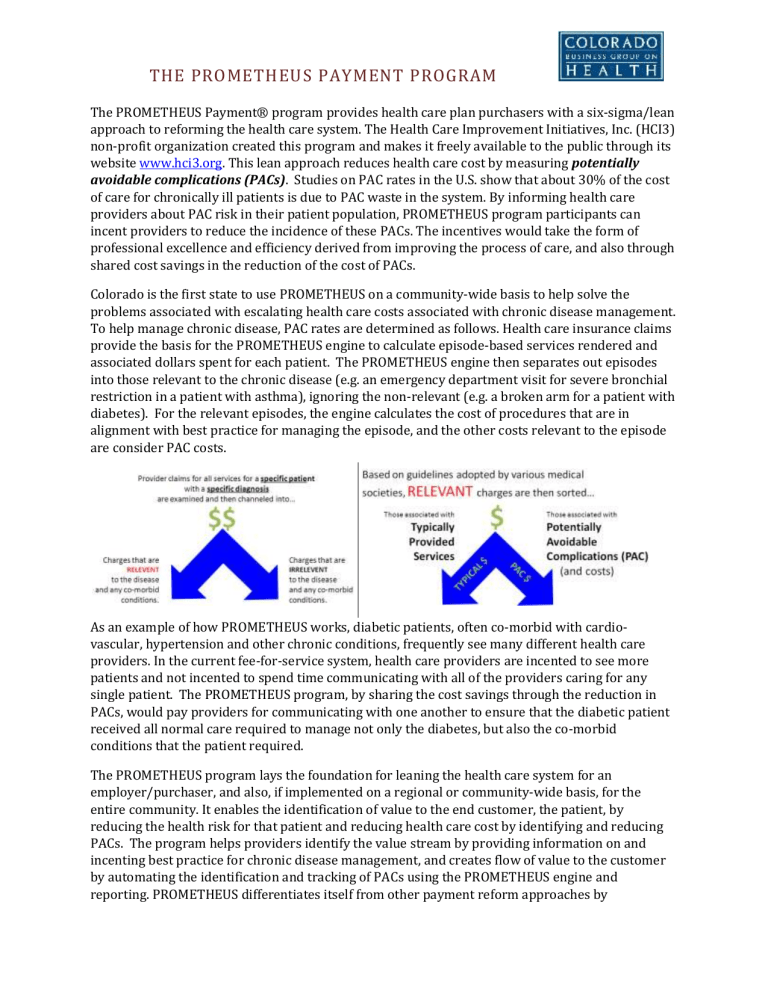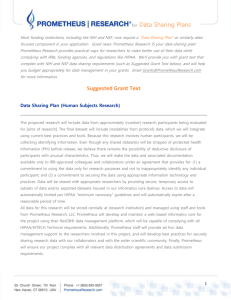The Prometheus Payment Program - Colorado Business Group on

THE PROMETHEUS PAYMENT PROGRAM
The PROMETHEUS Payment® program provides health care plan purchasers with a six-sigma/lean approach to reforming the health care system. The Health Care Improvement Initiatives, Inc. (HCI3) non-profit organization created this program and makes it freely available to the public through its website www.hci3.org
. This lean approach reduces health care cost by measuring potentially
avoidable complications (PACs). Studies on PAC rates in the U.S. show that about 30% of the cost of care for chronically ill patients is due to PAC waste in the system. By informing health care providers about PAC risk in their patient population, PROMETHEUS program participants can incent providers to reduce the incidence of these PACs. The incentives would take the form of professional excellence and efficiency derived from improving the process of care, and also through shared cost savings in the reduction of the cost of PACs.
Colorado is the first state to use PROMETHEUS on a community-wide basis to help solve the problems associated with escalating health care costs associated with chronic disease management.
To help manage chronic disease, PAC rates are determined as follows. Health care insurance claims provide the basis for the PROMETHEUS engine to calculate episode-based services rendered and associated dollars spent for each patient. The PROMETHEUS engine then separates out episodes into those relevant to the chronic disease (e.g. an emergency department visit for severe bronchial restriction in a patient with asthma), ignoring the non-relevant (e.g. a broken arm for a patient with diabetes). For the relevant episodes, the engine calculates the cost of procedures that are in alignment with best practice for managing the episode, and the other costs relevant to the episode are consider PAC costs.
As an example of how PROMETHEUS works, diabetic patients, often co-morbid with cardiovascular, hypertension and other chronic conditions, frequently see many different health care providers. In the current fee-for-service system, health care providers are incented to see more patients and not incented to spend time communicating with all of the providers caring for any single patient. The PROMETHEUS program, by sharing the cost savings through the reduction in
PACs, would pay providers for communicating with one another to ensure that the diabetic patient received all normal care required to manage not only the diabetes, but also the co-morbid conditions that the patient required.
The PROMETHEUS program lays the foundation for leaning the health care system for an employer/purchaser, and also, if implemented on a regional or community-wide basis, for the entire community. It enables the identification of value to the end customer, the patient, by reducing the health risk for that patient and reducing health care cost by identifying and reducing
PACs. The program helps providers identify the value stream by providing information on and incenting best practice for chronic disease management, and creates flow of value to the customer by automating the identification and tracking of PACs using the PROMETHEUS engine and reporting. PROMETHEUS differentiates itself from other payment reform approaches by
THE PROMETHEUS PAYMENT PROGRAM empowering physicians to make clinically-based improvements. The absence of clinically-based, actionable reports in other payment reform systems prevents physicians from pursuing lean.
Employers engaging in PROMETHEUS on behalf of their health plan participants establish pull for this lean approach and improved value from providers by matching health plan design with the improved flow of value empowered by the PROMETHEUS program. Continuous improvement comes with quarterly reviews of the PROMETHEUS data at the patient, provider and community level, as well as annual reward true-ups for the providers who deliver care under the PROMETHEUS program.
HCI3 is part of the team that was recently selected as the bundled payment supplier for Medicare using an approach that aligns with PROMETHEUS. PROMETHEUS also has piqued the interest of
Colorado State Medicaid. The Colorado Health Foundation has funded $3M for a 3-year project in three Colorado communities: Boulder/Longmont, the San Luis Valley and Colorado Springs. This project has just started its second year and has shown initial feasibility and buy-in in the three target communities. Many self-funded employers in the Colorado Springs area are participating in the Colorado PROMETHEUS pilot. An initial assessment of PAC cost rates in Colorado shows the following results for seven chronic diseases (Coronary Heart Failure – CHF, Chronic Obstructive
Pulmonary Disease – COPD, Diabetes, Asthma, Hypertension – HTN, Coronary Artery Disease – CAD, and Gastroenterological Reflux Disease – GERD). This initial look showed that we have wasted as much as 73 cents on the dollar paying for PACs in Colorado.
PAC
Percentage
Plan A
Plan B
Plan C
Plan D
Plan E
Plan F
CO Ave.*
US Ave.
US Max
US Min
CHF
65%
62%
58%
56%
73%
65%
63%
56%
69%
40%
COPD
47%
45%
45%
44%
47%
49%
46%
45%
61%
26%
DM
33%
25%
38%
30%
42%
36%
34%
29%
36%
21%
Asth.
34%
32%
35%
36%
45%
37%
37%
29%
41%
22%
HTN
23%
21%
23%
20%
25%
27%
23%
17%
25%
14%
CAD
18%
15%
33%
13%
11%
25%
19%
14%
23%
9%
GERD
29%
31%
42%
25%
36%
26%
32%
35%
43%
17%
THE PROMETHEUS PAYMENT PROGRAM
The following prevalence data on these chronic diseases indicate the degree to which these diseases affect the end population:
CHF affects 4.8% of adults in the U.S.A. (U.S. Center for Disease Control – CDC)
COPD affects 5% of adults over 18 in the U.S.A. (CDC)
Diabetes affects 7% of adults over 18 in the U.S.A. (CDC)
Asthma affects over 7% of people in the U.S.A. (Asthma and Allergy Foundation of America)
Hypertension affects 25% of adults in the U.S.A. (American Heart Association)
Coronary Artery Disease affects 6% of adults in the U.S.A. (CDC)
Gastroenterological Reflux Disease affects 25-35% of people in the U.S.A. (American
Academy of Family Physicians)
The Colorado Business Group on Health (CBGH), a state-wide, non-profit coalition of health care purchasers ( www.cbghealth.org
), offers support for the participation of self-insured employers in this lean initiative to improve the health care system in Colorado. If you have any questions or would like to discuss PROMETHEUS, please contact Bob Smith at Robert.Smith@CBGHealth.org
, or mobile (303) 304-1496.










